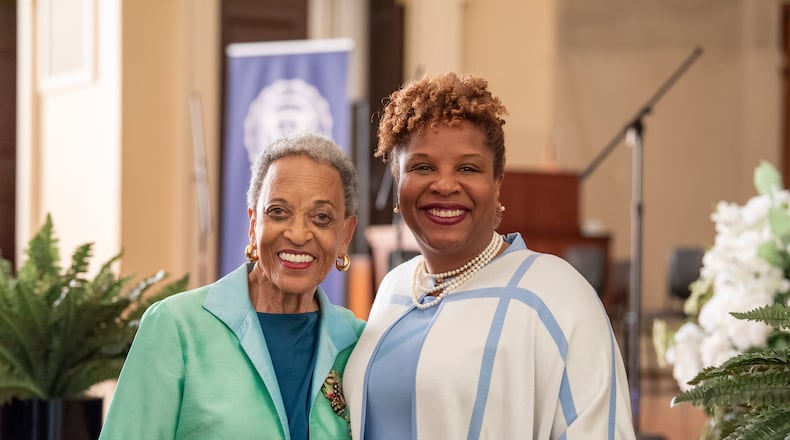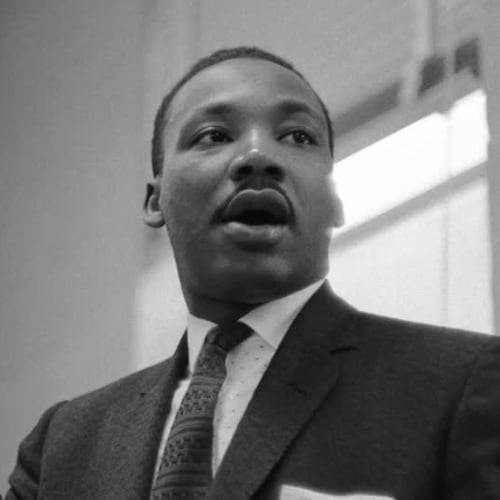For me, it began with The Voice. Anyone who has heard Dr. Johnnetta Betsch Cole speak, knows exactly what I am talking about.
If you have not had the pleasure, I will do my best to capture in flat letters the aural experience that transformed a chapel full of anxious girls into determined young women.
First, allow me to set the scene.
The year was 1987. Sisters Chapel, the spiritual heart of Spelman College, features majestic white columns outside and dark wood pews inside. In those days, there was no air-conditioning, so the atmosphere was dense with humidity and anticipation that August afternoon.
We, first-year students, wore mandatory white dresses, sheer hosiery, and black closed-toe shoes, a custom dating more than a century.
Up on the stage, Dr. Cole - tall, lean, and sporting a slightly angular afro - seemed to be a visitor from a neighboring, more evolved, society.
Credit: Julie Yarbrough
Credit: Julie Yarbrough
Her voice was definitely that of a woman, and imbued with the rounded soul-deep tones of a person of the cloth.
“MY SPELMAN SISTERS.”
Leaning into the first syllable of Spelman, elongating the single L, would become her signature delivery. She called, and we responded by roaring with joyous acceptance.
Neither we - nor the college - would ever be the same.
This triumphant greeting was the culmination of a generations-long struggle.
A decade earlier, in 1976, students, faculty and staff staged the great “lock-in,” capturing the Board of Trustees in their meeting room, refusing to release them until they had chosen a Black woman to lead this historically Black college for women.
About 500 students - out of a student body of about 1200 - bunked in the hallways and classrooms overnight.
These women were bold dreamers and brave actors.
Credit: Julie Yarbrough
Credit: Julie Yarbrough
But, for the short term, at least, they were unsuccessful.
Donald Stewart, a Black man, was chosen to secede Albert Manley, also a Black man, who had come after the white women who served as presidents of Spelman College since its founding in 1881.
As an undergraduate, and even years later, I was ignorant of the sacrifices and conflicts that had allowed me to witness that historic moment in our chapel in 1987. I had grown up in Atlanta, so I was no stranger to seeing Black folks in leadership roles.
My high school principal had even been a Black woman. I wasn’t hungry for a leader that “looked like me,” as people say.
I didn’t know it but I was yearning to be spoken to by a Black woman as a Black woman.
Credit: DAVID TULIS
Credit: DAVID TULIS
Surrounded by the tones of her magnificent voice, we swelled with admiration, but also possibility. She was a historic president, and we were a historic class- the first to matriculate all four years under this new order.
When Johnnetta Betsch Cole identified us as her Spelman Sisters, it was an embrace, but also a challenge, a charge and a promise.
These were the Camelot years, the dawn of an era in which Black women took control of their education and, therefore, their destinies.
“Western Civ,” that general education chestnut, was replaced by “African Diaspora and The World.”
Audre Lorde, the canonical feminist theorist, selected the Spelman archive as the home for her papers.
Dr. Cole’s fundraising yielded gifts that were unprecedented for a historically Black college, and that momentum continues to this day. And perhaps the greatest tribute to her time at Spelman is the students who matriculated on her ten-year watch and beyond.
Credit: Julie Yarbrough
Credit: Julie Yarbrough
Their accomplishments are well documented but there is more ethereal evidence of her immeasurable contribution.
Three years ago, I — along with my classmate, Sabrena McBride — set out to raise a $1 million endowment in the name of Dr. Cole.
The scholarship, titled “Dream The Boldest Dreams,” benefits Spelman students who are the first in their families to go to college.
We raised this money from donations from those whose lives have been touched by Dr. Cole. The letters and testimonies were overwhelming.
A well-connected father remembered her counseling him to step back and let his daughter stand on her own merits. Others recounted funds that she somehow “found” that cleared the way for graduation. Another wrote, “She gave me permission to speak of God in the feminine.”
Credit: Julie Yarbrough
Credit: Julie Yarbrough
This past autumn, we gathered in Sisters Chapel to celebrate Dr. Cole’s new book, “Speechifying,” and to mark the $1 million milestone of the endowment.
Dr. Cole, at 86 years old, sat on the stage flanked by her best friend, Beverly Guy-Sheftall, class of 1966; her protegee Celeste Watkins-Hayes, class of 1996, and Professor Erica Lorraine Williams. Dr. Cole was resplendent, clad in a lace tunic designed by Senegalese designer Safietou Seck, class of 1997.
Even though the chapel is now mercifully air-conditioned, the space was warm with so many well-wishers.
Alumnae had traveled as far as from Europe to fellowship once more with our Sister President.
Credit: Julie Yarbrough
Credit: Julie Yarbrough
To my right sat the first recipient of the scholarship endowed in Dr. Cole’s name, Amarea Wells. This bold dreamer is studying to become an emergency room physician. When she sweetly calls me “Ms. Tayari,” I am reminded of how many years have passed since I first sat in this sacred space.
To open the event Dr. Cole blessed us with a smile and The Voice, the music for which we had all been waiting.
“MY SPELMAN SISTERS.”
Credit: Julie Yarbrough
Credit: Julie Yarbrough
Naming and claiming us once more. We stomped our feet, cheering and waving our arms festooned with Dr. Cole’s signature beaded bangles.
In the joyous din of the moment, I turned my eyes to young Amarea who was as immersed in the occasion as those of us fueled by blue-white nostalgia. Her bright face, turned toward the stage, was a magic looking glass.
In it, I glimpsed our audacious future - the indelible legacy of Dr. Johnnetta Betsch Cole.
Tayari Jones is the internationally best-selling author of several novels, most recently “An American Marriage.” An Atlanta native and Spelman College alumna, she is the Charles Howard Candler Professor of Creative Writing at Emory University.
ABOUT THIS SERIES
The AJC’s Black History Month series focuses on the role of African Americans and the Arts and the overwhelming influence it has had on American culture. These daily offerings appear throughout the paper. More subscriber exclusives on the African American people, places and organizations that have changed the world are available at ajc.com/news/atlanta-black-history.
About the Author
The Latest
Featured








